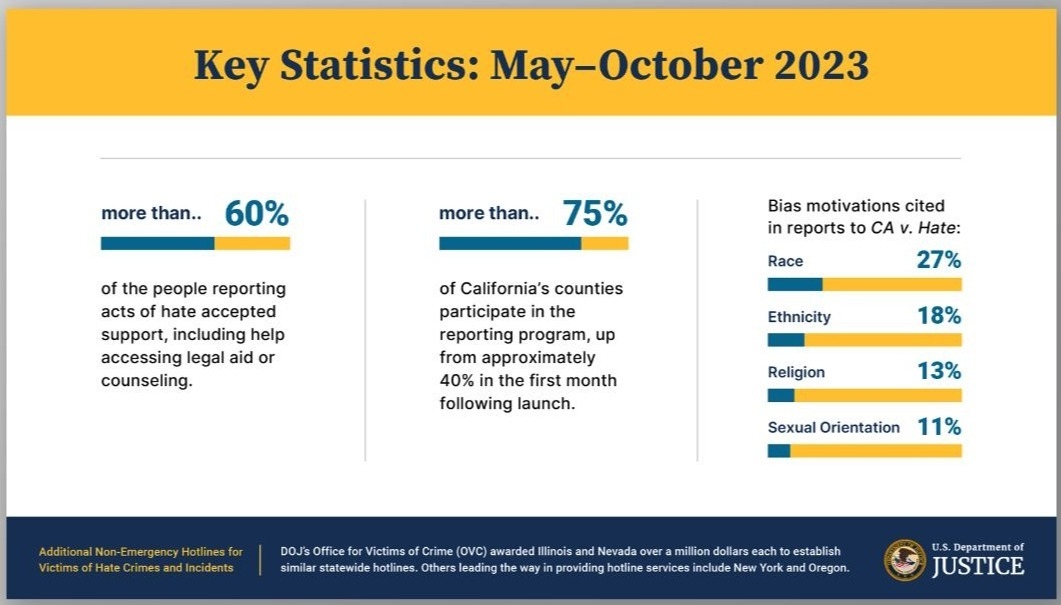

Joe has been harassed by his landlord, including being called derogatory names based on his sexual orientation and race. Now his landlord is threatening to evict him. Joe feels unsafe, but doesn’t want to call the police. He contacts California’s hate crimes hotline. What happens next? Keep reading to find out.
The Department of Justice awarded the state of California over a million dollars to expand community awareness of a statewide non-emergency hotline for victims of hate incidents and crimes launched in May 2023. The Department also funded hotlines in two more states. Why are hotlines necessary? How do they help people targeted for hate?
Many victims and witnesses to acts of hate do not report them due to fear of retaliation and lack of trust. Some people also fail to report or request help because of language barriers or a lack of cultural understanding. As described in Raising Awareness of Hate Crimes and Hate Incidents During the COVID-19 Pandemic, the failure to use trusted messengers to facilitate dialogue can also be an obstacle to victim reporting.
Hotlines provide a safe, anonymous reporting option for victims and witnesses of hate acts by offering a way to report what happened and receive support without contacting the police or law enforcement. The California vs. Hate Resource Line and Network (CA vs Hate) was developed in response to the rise in reported hate crimes in California, which in recent years reached their highest levels since 2001.
CA vs Hate connects callers with professionals trained in culturally competent communication and trauma-informed practices. An ongoing outreach campaign is encouraging hate crimes and incident reporting and access to resources through a multilingual digital, print, and radio ad campaign and community-specific outreach efforts.
CA vs Hate supports victims through a network of non-profit partners. Hotlines like California’s connect people targeted for hate to:
Some non-profit partners have deep ties within communities, and may help provide education, outreach, trainings, and health resources. They also inform strategies to help deescalate potential tensions that could lead to violence and discrimination.
Reporting hate incidents – and not only hate crimes – matters. An isolated incident may be part of a pattern. Tracking incidents not prosecutable as hate crimes may help prevent future acts of hate.
When I talk to people who have suffered acts of hate, they often talk about how they want to help prevent other people from experiencing the same thing. Many people don’t realize how reporting can help those who come after you. By documenting incidents and connecting people with resources, we can help make change in communities. So even if some might be hesitant to report, I think by sharing the whole picture of how reporting can support others, we can demonstrate the importance of coming forward.
– Sophie Cuevas, Care Coordinator, 211 LA (partner organization, CA vs Ha te )
Improving hate incident and crime reporting data is a key goal for the California vs. Hate Resource Line and Network. Reporting acts of hate allows communities and law enforcement to fully understand the scope of the problem in a community and put resources toward preventing and addressing attacks based on bias and hate.
Community-based organizations can assist and encourage reporting to law enforcement when a perceived hate crime does meet the elements of a criminal offense.

In CA vs Hate’s fictional case study example, Joe’s report to the hotline results in a care coordinator helping Joe file a discrimination complaint with the state’s civil rights department. The care coordinator also connects Joe to a nearby LGBT center and a racial justice organization to assist with counseling and relocation. For another illustration of the hotline’s impact, see CA vs. Hate: Empowering Change in the Face of Workplace Discrimination | 211LA .
In an emergency, dial 9-1-1 or local police to get immediate help. If you believe you are the victim of a hate crime or witnessed a hate crime, report the crime to state or local police and the FBI.